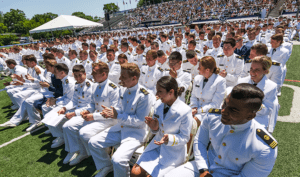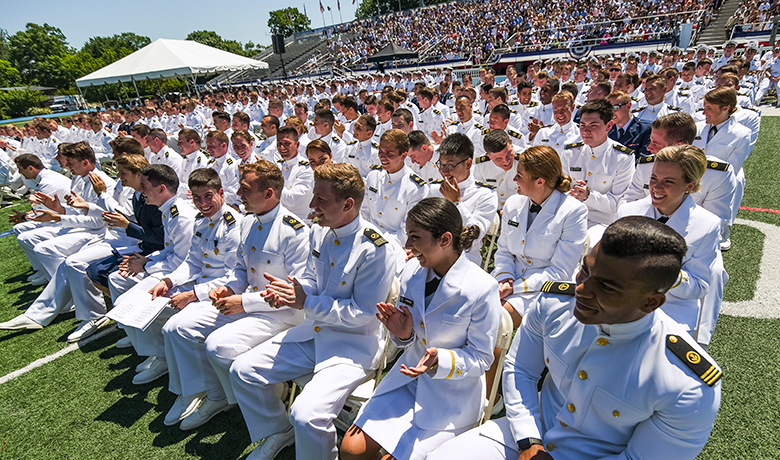
The U.S. Merchant Marine Academy (USMMA) has partially restored its Sea Year training program with new policies and procedures in place to protect students against sexual assault and harassment.
The U.S. Department of Transportation (DOT) and the Maritime Administration (MarAd) announced the resumption of the program on Dec. 22. The agencies paused it six weeks earlier after a female cadet reported she was raped while training on a merchant ship. This was the second such pause in five years for the academy located in Kings Point, N.Y.
For now, Sea Year will return on U.S. government vessels only after the six state maritime academies agreed to new standards and policies aimed at protecting students, the DOT said. The program will resume for commercial vessels when carriers show they have met the new standards for midshipmen safety.
Sea Year is a core component of the USMMA curriculum that dates to 1942. Midshipmen are paired and assigned to U.S.-flagged commercial and government ships to learn on the job. The program lasts about 100 days during a student’s sophomore year and about 235 days during their junior year. Students earn a small salary during their time at sea.
In addition to on-the-job training, the program allows the midshipmen to obtain the necessary days at sea to take the U.S. Coast Guard merchant officer license examination.
During the pause in the program, the DOT, MarAd and the USMMA reviewed the Sea Year requirements for commercial carriers and policies and procedures at the academy. They also sought recommendations from industry, labor and advocacy groups working to combat sexual assault and harassment. Congress and various federal agencies including the Coast Guard, as well as the USMMA midshipmen and alumni community, also weighed in on the proposed changes. Many midshipmen urged reinstatement of the program because they needed the sea time for their Coast Guard licenses.
“The plan … represents the collective commitment of DOT, MarAd, USMMA and the six state maritime academies to strengthen safety for cadets aboard commercial vessels, and to support an inclusive culture that prioritizes preventing sexual assault and harassment and supporting survivors,” acting Maritime Administrator Lucinda Lessley said in a statement. “The plan is an initial step, and all parties are committed to continuing to review this program frequently, and to make improvements whenever needed to ensure the safety and success of cadets.”
Changes to the Sea Year program were spurred by an anonymous online essay posted last fall by a female USMMA midshipman. She described in detail how her engineering supervisor plied her with alcohol and then raped her during Sea Year training. The incident allegedly took place on a U.S.-flagged Maersk Line ship while it sailed in the Middle East. It prompted investigations by the government and Maersk, which suspended five mariners pending the outcome of its investigation. Additional details on that investigation were not available in early January.
The essay resulted in male and female midshipmen coming forward with their own stories of abuse and harassment at sea and on campus. A group of U.S. senators responded by introducing a bill to help safeguard midshipmen while they trained at sea.
“Safety at sea requires teamwork both aboard vessels and between the vessel and shoreside management,” Rear Admiral John Mauger, Coast Guard Assistant Commandant for Prevention Policy, said in a statement. “Workplace climates which enable sexual offenses erode trust and teamwork and put mariners’ lives at risk. Sexual assault is a crime. When they happen aboard a U.S. vessel, it must be reported to the Coast Guard. Coast Guard investigators will respond, and we will hold offenders accountable.”
The DOT and MarAd released two documents with its announcement in December about the resumption of Sea Year. The first outlined a new MarAd program, Every Mariner Builds a Respectful Culture (EMBARC), that contained more than 30 new safety measures commercial carriers will be required to meet before they can carry cadets. The EMBARC program also establishes a process for ensuring continuous review and improvement.
The second document specifies new policies and procedures to be implemented at the academy and to increase support for cadets at sea. Among the new initiatives, USMMA will provide additional training before Sea year begins. The academy also will provide midshipmen with a satellite phone to communicate with family and friends, as well as academy personnel, while at sea.
The USMMA also has implemented a new amnesty policy to ensure victims who report sexual assault, as well as intervening bystanders and witnesses, will not be disciplined for violating alcohol or drug use policy at the time of the incident.
Rear Adm. Brennan, chairman of the Consortium of State Maritime Academies, said, “We believe these standards will help ensure a safe and healthy work environment for our cadets onboard these vessels.”
The 2021 pause in Sea Year training followed a longer suspension in 2016-2017 in response to reports of sexual harassment and assault, hazing, bullying, coercion and retaliation during time at sea. The program resumed following the development of new protocols aimed at preventing those incidents.

